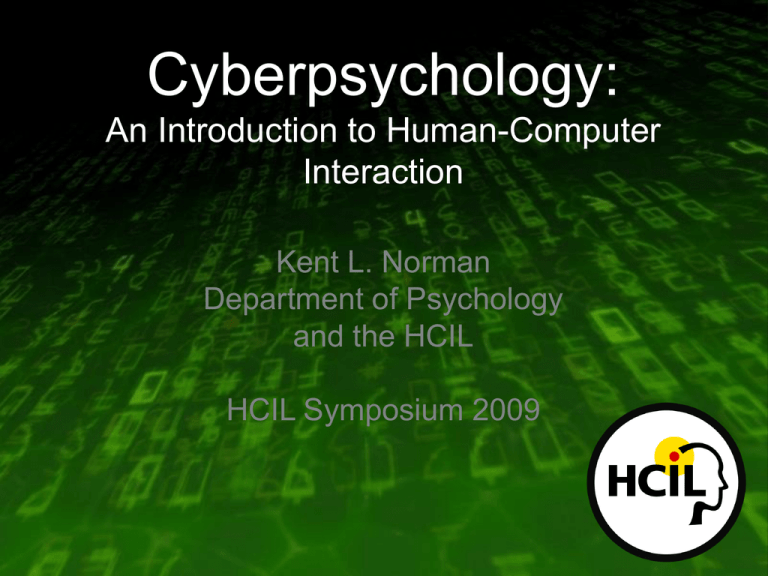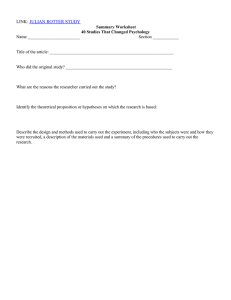(slides 8MB)
advertisement

Cyberpsychology: An Introduction to Human-Computer Interaction Kent L. Norman Department of Psychology and the HCIL HCIL Symposium 2009 Cyberpsychology • the study of the impact of computers, technology, and virtual environments on the psychology of individuals and groups Analog or Digital The Digitizing of Our World Boolean algebra Digital Storage George Boole 1815-1864 Herman Hollerith 1860-1929 Digital Computers The Internet Claude Shannon 1916-2001 J. C. R. Licklider 1915 – 1990 The Psychologizing of Our World Father of experimental psychology WilhelmWundt 1832-1920 First American psychologist William James 1842-1910 Classical conditioning and learning The self and the unconscious Ivan Pavlov 1849-1936 Sigmund Freud 1856-1939 Audience(s) • Psychology undergraduates who need to know about how people fit into the changing world of technology. • Computer science students who do not have a sufficient background in the psychology of the user to begin studying HCI. • Everyone whose life is affected by computers. Cyberpsychology Chapters • Historical Perspectives • Biological and Technological Bases • Theories Models, and Metaphors • Research: Modes and Methods • Sensory-Motor Interfaces: Input and Output • Learning, Memory, and Retrieval • Cognitive: Thinking and Problem Solving • Language and Programming Cyberpsychology Topics • Individual Differences and Personality • Motivation, Emotion, and Affect • Interpersonal Relations • Abnormal Behavior and Cybertherapies • Automation and Artificial Intelligence • Assistive and Enhancing Technologies • Games, Entertainment, and Education • The Ultimate Human-Computer Interface • Language and Programming Biological and Technological Foundations (humans on the left, machines on the right) The Human/Computer Interface Sensory-Motor I/O Social Computing Social computing is a general term for an area of computer science that is concerned with the intersection of social behavior and computational systems. • Facebook • Myspace • Blogspace • Youtube New Cyberpathologies and new Cybertherapies • Cyberphobias, Cybergenic Stress Syndrome • Internet manifestations of old pathologies • Online therapies Student Comments: • I actually felt that the book was very wellwritten and most importantly, concise. Very easy to learn the information and the course was designed such that it was a wonderful study aid. • I liked the way it was organized it covered a lot of aspects of psychology and technology that I didn’t think it would. The End (or just the beginning)



